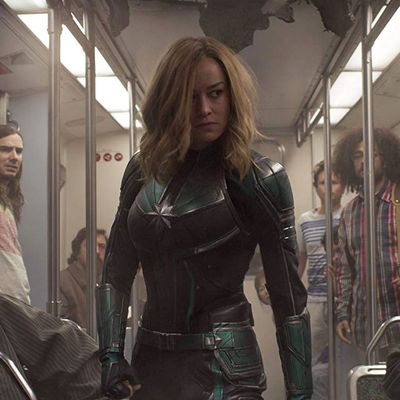
After decades of downplaying the roles of superheroines (former Marvel movie pooh-bah and top Republican donor Ike Perlmutter reportedly gave girls a thumbs-down on the grounds that no one would buy the merch), the studio’s first female-fronted release Captain Marvel finally arrives in the person of Oscar winner Brie Larson. She and the movie mean business, in all senses. At the start, Larson’s character, Vers — a soldier for the Kree, a “race of noble warrior heroes” — is captured by the shape-shifting Skrulls, who put her upside down and probe her memories. What Vers recalls is not her recent past but an earlier one that appears to have unfolded on “Planet C-53,” a place where men were always lecturing her about what she shouldn’t do. She shouldn’t pedal a bike so fast. She shouldn’t play baseball. She shouldn’t bother to get off the ground when she takes a fall in basic training. She shouldn’t be a pilot because, “Why do you think it’s called a cockpit?” No one says she shouldn’t be a superhero because no one will buy the merch, but that’s obviously one subtext. When she awakes, she figures that someone has some ‘splainin’ to do — but not, for a change, mansplainin’.
The female-empowerment message of Captain Marvel might be late, but its timing could hardly be happier. Not only is this captain a woman (Marvel Comics’ first Captain “Mar-vell” was a man) but her “origin story” now serves as the prologue to Avengers: Endgame (opening in mere weeks), in which she’ll presumably lead the souped-up but strangely impotent Iron Man, Thor, Captain America, and the Hulk in the battle to reconstitute billions of entities — among them the super-profitable Black Panther, Spider-Man, and Dr. Strange. So, in a way, the Marvel Universe can be seen at this precise moment as resting on the shoulders of a woman — and a relatable, down-to-C-53 woman, whose manner is as ordinary as her power is extraordinary. Larson gives a breezy, buoyant performance that often reminded me of Patty Duke as “Patty” in The Patty Duke Show, which might be the highest praise I can bestow. A badass Patty Duke is a marvel of evolution.
The movie itself is spotty, but it gets better as it goes along. That’s not hard, since the opening scene on the planet Hala is weightless and the subsequent battle sequence poorly staged and shot. As directed by Anna Boden and Ryan Fleck, the film often recalls not Star Trek or Star Wars but Starcrash, a painfully clunky Canadian knockoff with Marjoe Gortner, Caroline Munro, and Christopher Plummer (as a hologram) doing his bit for his homeland’s ’70s tax shelters. The Plummer equivalent in Captain Marvel is Annette Bening, who as the “Supreme Intelligence” speaks to Vers on one of those misty soundstages that in sci-fi movies symbolize the realm between fantasy and reality — but who also shows up, mysteriously, in fractured memories from C-53. Easily one of my top-five favorite living actors, Bening is more naturally suited to roles in which supreme intelligence collides with supreme emotion. Also, when she has some halfway speakable lines.
Captain Marvel doesn’t really get going until Vers falls to C-53 and crashes through the roof of a Blockbuster Video (they were a thing in 1995, when the film is set) and Samuel L. Jackson shows up with hair and two eyes. Jackson’s Nick Fury has been de-aged with CGI but not alarmingly so, at least compared to Clark Gregg as Phil Coulson, who loses not just lines but character lines. His face is like a white smudge. Although the head of the burgeoning S.H.I.E.L.D., Fury acts like a cop at this juncture, which means he and Vers can do mismatched-buddy banter while dodging the Skrulls (led by Ben Mendelsohn) and, later, the mega-weaponized Kree, led by the film’s biggest mansplainer, Yon-Rogg (Jude Law) — who’s always telling Vers that her emotions are making her too vulnerable to be a good fighter. Many of the Vers-Fury punch lines go thud, but I like that the filmmakers have tried to create some warmth between the characters. Fury is usually such a cold fish. Here, he’s a kissy-poo cat fancier.
Disney has warned critics not to reveal too much about Captain Marvel, which is why I can’t say more about Bening, Law, or Mendelsohn — although the latter manages to be funny with Cockney inflections under his Skrull skull. Lashana Lynch has a couple of good, emotional scenes as pilot Maria Rambeau, who at one point decides to stay with her little girl, Monica (Akira Akbar), on their rural Louisiana farm rather than take to the skies to fight aliens — at which point Monica chides her with, “Consider what kind of example you’re setting for your daughter!” That’s an amazing line, insofar as most will cheer it while the spiritual descendants of the late Equal Rights Amendment foes Phyllis Schlafly will cry, “See! See! They want to make us women be superheroes and abandon our children!” My Marvel Avengers Encyclopedia tells me that Maria’s participation is important, given that Monica has a future in this superhero biz. (It also tells me that Absorbing Man, Power Man, Captain Britain, Moon Knight, and about 200 other low-on-the-Marvel-food-chain figures are tomorrow’s potential Avengers and/or supervillains.)
The best reason to see the movie is Larson, who showed how terrific she could be in Short Term 12 and Room as women whose ways of fighting back were frustratingly earthbound. At full strength, her Captain Marvel is a goddess emitting her own light — an astral version of Liberty at the battlements, sublime and terrifying. In my favorite moment, she returns from outer space, loses the cosmic luminescence, and gives a little smirk that suggests, “Aren’t I Marvel-ous?”


